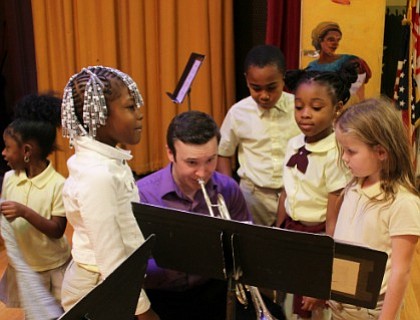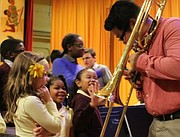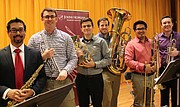BALTIMORE — Young Audiences, the nation’s largest arts-in-education provider, announced this morning a new partnership with The Peabody Institute to bring classical music and opera to students and classrooms in Baltimore City and throughout the state.
Courtesy of The Peabody Institute of Johns Hopkins Unviersity
Beginning with the current school year, top-level Conservatory student musicians will perform musical programs in Baltimore City and Maryland Schools. With help from Young Audiences, the programs will be available to all 181 Baltimore City schools and the city’s 80,000+ students. Peabody’s presence in schools will come in the form of two programs: Marquee Brass and Peabody Opera Theatre.
Beginning with the current school year, top-level Conservatory student musicians will perform musical programs in Baltimore City and Maryland Schools. With help from Young Audiences, the programs will be available to all 181 Baltimore City schools and the city’s 80,000+ students. Peabody’s presence in schools will come in the form of two programs: Marquee Brass and Peabody Opera Theatre.
Marquee Brass features five virtuoso musicians – all Peabody graduate students– performing for students their “Sounds of Music” and “Paths of Music” programs which bring the art of brass music into a new, exciting light. The Peabody Opera Theatre will present Papageno!, a shortened version of the timeless tale of The Magic Flute as told from the perspective of the endearing Papageno, the Bird Man himself. The production is fully costumed and staged and cast entirely of Peabody Conservatory students with Peabody Opera Department faculty serving as its artistic and music directors.
Every year, Young Audiences identifies, prepares and connects more than 7,000 arts learning experiences to more than 190,000 students throughout the state of Maryland. They train teaching artists and connect them with schools, classrooms and students to expand the learning experience and inspire our children. Through this partnership, Young Audiences is enhancing their offering of classical music to children – the original focus of the organization.
“We are deeply concerned that so many of our young people lack access to the rich cultural institutions in our city as part of our education and that the arts have been squeezed out of the school day. At Young Audiences, we see artists and the creative process as a catalyst for inspiration across curriculums,” said Stacie Sanders, Young Audiences Executive Director. “Young Audiences is thrilled to partner with the Peabody Institute and harness the immense talent of their musicians to have a deep impact on the education and lives of our children. This is just the beginning when it comes to what our two institutions can do together.”
This new initiative rekindles a decades-old partnership between Young Audiences and The Peabody Institute. Founded in 1950 with the sole purpose of introducing children to classical music by professional musicians, Young Audiences was based at Peabody, benefiting in those early days from the Institute’s guidance and musical expertise. Young Audiences has since expanded to offer all art forms. A special fund called Access for All will underwrite the costs of Peabody programs to any interested Baltimore City School whose students lack access to classical music and opera programs.
Courtesy of The Peabody Institute of Johns Hopkins Unviersity
Marquee Brass features five virtuoso musicians – all Peabody graduate students
“Community Connectivity is now one of the pillars of Peabody’s vision, and nothing is more important than connecting with children through music, across communities,” said Fred Bronstein, Dean of the Peabody Institute. “And by doing this, Peabody is providing our students with invaluable experience in what it means to be a 21st century citizen-artist in communities today.”
About Young Audiences/Arts for Learning
Young Audiences is the nation’s largest arts-in-education provider and started in Baltimore in 1950. As a Young Audiences affiliate, Young Audiences/Arts for Learning (YA) is a nonprofit organization devoted to enriching the lives and education of Maryland’s youth through educational and culturally diverse arts programs for more than 65 years. Each year, YA reaches more than 190,000 students through over 7,000 arts learning experiences by partnering professional artists from all disciplines with schools throughout Maryland for hands-on arts learning experiences. We envision a Maryland where the arts are valued for their capacity to transform lives, and where every student is immersed in opportunities to imagine, to create, and to realize their full potential through the arts. For more information, contact YA at 410-837-7577 or visit yamd.org.
About the Peabody Institute of the Johns Hopkins University
Located in the heart of Baltimore’s Mount Vernon Cultural District, the Peabody Institute was founded in 1857 as “the first major intellectual and arts center in an American city” by philanthropist George Peabody. Now a division of Johns Hopkins University, the Peabody Institute trains musicians and dancers of every age and at every level, stages nearly 1,000 concerts and events each year, and extends music and musical training throughout the community. Building on its rich history of professional music training at the highest level and focused on the four pillars of excellence, interdisciplinary experiences, innovation, and community connectivity, Peabody is taking on the challenge of what it means to prepare artists for a world that is constantly changing yet still deeply in need of what music brings to the human experience.


